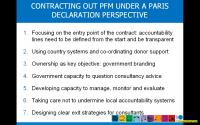
To whom is a private sector consultant accountable, the donor paying their bill or the country to which they are providing technical assistance?
Private sector consultants are widely used in managing and implementing Public Finance Management reform, yet questions of accountability, and consultants' role in influencing the reform agenda is under examined.
According to Sara Fyson, a policy adviser from the OECD's Aid Effectiveness Division, donors need to pay more attention to the expanding role consultants are playing in public finance management reform, noting that the World Bank alone generates about 40,000 consultant contracts a year.
"All in all there's an increase in the use of consultants in public finance management and public sector reform generally, and yet it is surprising that there is little attention on their role and impact of the consultants at the country level," said Ms Fyson in an interview with www.Capacity4Dev.eu.
"So really this is a question that we need to look at, it is big business," said Ms Fyson. "It's about making sure that the consultants are accountable at the country level and that they really deliver what the country needs."
Using the implementation of an integrated financial management system in Ghana as an example for her presentation at EuropeAid headquarters, "Sending in the Consultants" , Ms Fyson explored the role of consultants in the development business, their impact on budget reforms and how private sector consultants are held to account, and by whom.
Ms Fysons study produced a number of recommendations, including the need to identify accountability lines at the start of any consultancy contract and the importance of the recipient government's ability to question and interrogate consultants' advice.
Those recommendations are given in full in the table below.
Ms Fyson demonstrated how some consultants' habit of grafting private sector best practice onto public sector reform can be problematic. Local limitations like erratic power supply or lack of experienced computer operators need to be taken into account when introducing state-of-the-art computerised budget management systems.
Enthusiasm from recipients can also be misleading, warned Ms Fyson.
"Some have suggested," said Ms Fyson, using her Ghana example, "that some of those in government have wanted to have the most sophisticated software system possible so that no one could understand it, so no one would be able to improve accountability seriously, but it would look good for donors."
Similarly, consultants operating in public finance management reform should not overlook the fact that government budget reforms are highly political. Ms Fyson demonstrated that political power changes can force unforeseen change at implementation level. A shift of power following Ghana's elections in 2000 forced around half of the country's senior civil servants out of post, even though civil servants are officially non-political government bureaucrats, and seriously derailed public finance management reforms.

Andy Wynne, a UK consultant and the editor of the International Journal on Governmental Financial Management, said that donors are over using consultants to achieve their development objectives and sometimes export systems or practices that might not suit the local context.
"Whatever initiative there is, the initial knee-jerk reaction is to employ consultants," said Mr Wynne. "You want to wake up in the morning? You employ a consultant to wake you up. You want to get out of bed in the morning? You employ an international consultant to advise you on best practice on how to get out of bed."
On a recent visit to Nigeria, Mr Wynne came across Nigerian officials who had been obliged by donors to accept international consultants that were not wanted or requested. To hear more, listen to an interview with Mr Wynne, here.
Andy Wynne Consultants Interview
Peter Fairman, a public sector specialist, suggested that governments take greater ownership of public sector reform by carrying out their own diagnostic studies before employing the help of external consultants.
"Too often the consultants come in and have already thought of a solution before they've clearly identified the solution," said Mr Fairman. "That leads to all kinds of issues down the road, such as what happened in Ghana and also in Uganda and various other countries."
Mr Fairman gave the example of Slovakia, a country which took strong ownership of the development of their integrated financial management system. Slovakia used home-grown IT expertise to develop a bespoke financial management solution rather than taking one of the off-the-shelf products widely used. Listen to Mr Fairman in full, here.
Peter_Fairman_Consultants_Interview
If you'd like to comment on Sara Fyson's presentation, or any of the views expressed in this article, join the discussion group, here.







(1)
Log in with your EU Login account to post or comment on the platform.
Ms Fysons study produced a number of recommendations, including the need to identify accountability lines at the start of any consultancy contract and the importance of the recipient government's ability to question and interrogate consultants' advice. I would like to thank you for sharing much information on this. It was helpful and interesting.